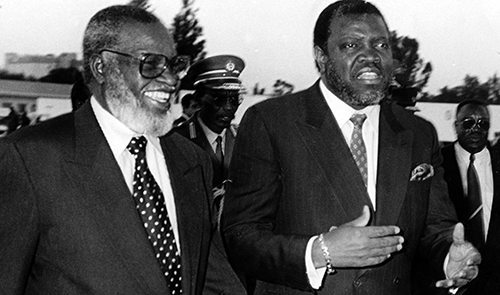Charmaine Boois
MARIENTAL – Memories of oppression and the struggle for freedom remain vivid for many residents of Hardap region, and Namibia at large. With the passing of Founding Father Sam Nujoma, many recall how his leadership ignited a flame of hope during those dark days.
Rehoboth Urban West councillor Herald Kambrude and elders Miriam Higoam, Magdalena Hanse and Maria Boois spoke to Nampa about how Nujoma’s vision transformed their lives and that of the rest of the nation.
Higoam (62), Hanse (73) and entrepreneur Boois smiled as they recalled a time when Nujoma’s leadership offered a beacon of hope, amidst the harsh realities of apartheid.
Higoam, who grew up in a small settlement behind Gibeon, recalled how, as a young girl, she was always in the house doing needlework, obeying the rules of apartheid, even though she could not bear it.
News of Nujoma and People’s Liberation Army of Namibia (Plan) fighters battling South African forces in northern Namibia inspired communities in the south, including Higoam, to join the struggle against apartheid.
“While Nujoma and the Plan fighters were fighting up north, many communities on the ground also joined the fight in their way by supporting Swapo, the driving force behind the independence movement,” Higoam said.
Boois highlighted Nujoma’s non-tribalistic approach as a defining quality.
“What I loved about him is that he worked with everyone; he was not tribalistic. Post-independence, he continued to collaborate with different politicians from the south like Priscilla Beukes and the late education minister, Katrina Hanse-Himarwa. He ensured that he included all people from all the regions when deciding what was best for the people in the country,” she said.
Hanse spoke with a heavy heart about the late Nujoma, saying his enormous accomplishments and sacrifices may never be fully understood by the current generation.
“We were apartheid prisoners, we were voiceless, and it seemed like we didn’t have worth in society, we had to follow regulations. Imagine, we had to buy bread through a window as we were not even allowed to enter the same stores as white folks,” she recalled.
Hanse added that there were no laws to protect black people as they suffered abuse at the hands of their employers. Nujoma, however, enabled them to have a voice and the autonomy to choose whether they wanted to endure the abuse or not. She recalled her time as a young woman in Keetmanshoop during the conflict between South African forces and Plan soldiers, describing it as nerve-wracking. News of Plan victories, however, brought immense joy.
“I remember when we heard the news of us finally being free from apartheid; we danced and celebrated. That’s why his death is painful. It’s all because of him that we have the luxury to sit on our stoep drinking our tea with no worries about war or being colonised,” said Hanse.
Kambrude said Nujoma’s bravery and perseverance were the characteristics that influenced the course of Namibia’s independence.
“Being at the helm of Swapo and being the driving force towards independence took immense bravery and leadership. During the armed struggle, it would have been easier to just give up, but Nujoma did not. Instead, he was determined, and he believed that even though it would cost our lives, we had to fight for our freedom,” he said.
Nujoma died at the age of 95 on 08 February 2025.
– Nampa



